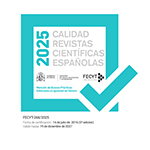The origins of historical memory in Spain: The costs of memory-related efforts in the Spanish transition
Abstract
For quite a long time Spain has been debating whether its Transition to democracy was based upon oblivion or silence regarding the Spanish Civil War and Francoism, or whether an interest on both issues patently shows on many and diverse publications. Undoubtedly, the war was far more and variedly present that the dictatorship during the Transition, and now it is clear that those who pioneered what in later days would be called historical memory claims began their activities precisely during that period. The purpose of this paper, however, is to show that actions aimed to vindicate the remembrance of Francoism’s victims took place, almost exclusively, in local environments and that they were taken by relatives of those executed by the dictatorship or, if anything, local authorities in cooperation with these families. The support of the main regional, and even less so national leftist parties and unions apparatuses was barely non-existent. It is also stressed here that those who began to clear this way were faced with many difficulties, even facing personal risks and confront still powerful actors unwilling to accept the country’s democratization and the resultant change in the inherited historical narrative. The case in point used to prove all these claims is the village of Torremejía (Badajoz), whose first democratically elected mayor was sued for having helped some of his neighbors to move the remains of persons executed by Francoists from the common grave they were into the village’s cemetery. We have been the first researchers to gain access to the relevant judicial file, direct testimonies, and the village archive. The importance of this case goes well beyond the local limits and serves to illustrate both the Transition’s possibilities and its limits.
Downloads
Article download
License
Aquellos autores/as que tengan publicaciones con esta revista, aceptan los términos siguientes:
a. Los autores/as conservarán sus derechos de autor y garantizarán a la revista el derecho de primera publicación de su obra, el cuál estará simultáneamente sujeto a la Licencia de reconocimiento de Creative Commons Reconocimiento-No comercial-Sin obra derivada 4.0 España que permite a terceros compartir la obra siempre que se indique su autor y su primera publicación esta revista.
b. Los autores/as podrán adoptar otros acuerdos de licencia no exclusiva de distribución de la versión de la obra publicada (p. ej.: depositarla en un archivo telemático institucional o publicarla en un volumen monográfico) siempre que se indique la publicación inicial en esta revista.
Plagio y fraude científico
La publicación de un trabajo que atente contra los derechos de propiedad intelectual será responsabilidad de los autores/as, que serán los que asuman los conflictos que pudieran tener lugar por razones de derechos de autor. Los conflictos más importantes pueden darse por la comisión de plagios y fraudes científicos.
Se entiende por plagio:
1.Presentar el trabajo ajeno como propio.
2.Adoptar palabras o ideas de otros autores sin el debido reconocimiento.
3.No emplear las comillas u otro formato distintivo en una cita literal.
4.Dar información incorrecta sobre la verdadera fuente de una cita.
5.El parafraseo de una fuente sin mencionar la fuente.
6.El parafraseo abusivo, incluso si se menciona la fuente.
Las prácticas constitutivas de fraude científico son las siguientes:
1.Fabricación, falsificación u omisión de datos y plagio.
2.Publicación duplicada.
3.Conflictos de autoría.












